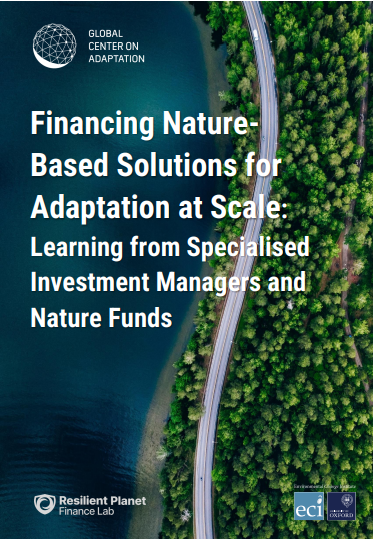Scaling funding to effective nature-based solutions (NbS) for adaptation is key to tackle climate change and support sustainable development. NbS can play a crucial role in adaptation and investments deliver multidimensional benefits for climate mitigation, resilience, people and livelihoods as well as the protection, maintenance, or enhancement of biodiversity. UNEP estimates that approximately $11tn of investment in NbS is required between 2022 to 2050, equating to over $500bn of annual investment by 2030. This means that investment into NbS needs to be quickly and drastically scaled from its current levels of around $200bn per year. This report is a first output from the project “Global Tools to Unlock Capital for Investments in Nature-Based Solutions” of the Global Center on Adaptation in partnership with the Environmental Change Institute (ECI) at the University of Oxford.
This first output, completed by the Resilient Planet Finance Lab at the ECI, reviews the status of nature finance globally, to learn from the role played by nature-focussed funds and their investment managers, understand what works, and draw conclusions for how we might mobilise more financing for nature-based solutions for adaptation. This knowledge will inform a roadmap and toolkit for identifying viable investment modalities in Bangladesh. Our focus is on exploring opportunities to overcome the barriers that hold back finance and action for NbS at scale. These common barriers can include: (i) the novelty, relatively long-time scales (and so risk), (ii) local specificity (and so low replicability) and small-scale of these investments versus (ii) the relatively small commercial returns, linked to inability to monetise the full benefits of NbS, as well as (iv) difficulties in quantifying results. The lack of a conducive policy environment, both in terms of regulations and incentives, and appropriate sustainable finance frameworks, particularly in emerging and developing markets, can also be a barrier. To better understand and learn from what works, we generate and analyse a new database of the activities of 25 nature funds and their investment managers, based on publicly available data and analyse case studies.
While this report focusses on opportunities to scale up private finance, it is important to note that given the public good nature of many NbS investments for adaptation, public finance will also play an important role.








